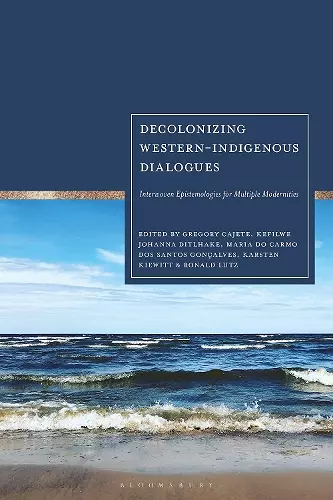Decolonizing Western-Indigenous Dialogues
Interwoven Epistemologies for Multiple Modernities
Gregory Cajete editor Ronald Lutz editor Maria do Carmo dos Santos Gonçalves editor Karsten Kiewitt editor Ditlhake Kefilwe Johanna editor
Format:Hardback
Publisher:Bloomsbury Publishing PLC
Published:2nd Oct '25
£85.00
Supplier delay - available to order, but may take longer than usual.

This groundbreaking book offers a unique collection of Indigenous and non-Indigenous approaches to decolonizing international development.
The world is facing enormous challenges, from ever-growing global inequality to climate change to the continuing fallout from the Covid pandemic. It is becoming increasingly clear that the origin of these challenges lies in the economic models and imperial lifestyles perpetuated by the Global North. In order to find new answers to the world's biggest challenges, then, it is necessary for the Global North to acknowledge Indigenous knowledge systems as unique and legitimate epistemologies and to engage in dialogues with them.
This collection brings together contributions from Indigenous and non-Indigenous authors to promote that dialogue. It provides a unique, rare forum for discourse between the expressive potentials of differing world views, and ultimately, for developing cooperation in the terms of Eisenstein’s notion of interbeing, which counteracts the “History of Separation” between nature and culture and between Global South and Global North. What emerges is a path forward towards a new, interwoven modernity characterized by an embrace of separate, but mutually constitutive, ways of knowing.
For its wide topical and geographic breadth, and for its bringing together of Indigenous and non-Indigenous scholars around the world, this book is a must-read for researchers and students interested in indigenous studies and decolonial approaches to international development.
Decolonizing Western-Indigenous Dialogues: Interwoven Epistemologies for Multiple Modernities is a profound and necessary contribution to the urgent global project of epistemic justice. This compelling volume brings together Indigenous and non-Indigenous voices in a rich, respectful, and reflective dialogue that challenges dominant paradigms and affirms the value of diverse ways of knowing. It offers critical insights into decolonial thought and practice across contexts, making it an essential resource for students, scholars, educators, policymakers, and practitioners committed to transforming education, research, and inclusive development. By promoting an ethic of listening, reciprocity, and relational accountability, this book does not merely advocate for decolonisation but embodies it. * Mpumelelo E. Ncube, professor of social work at the University of the Free State, RSA *
By exploring Indigenous knowledge systems and their interconnectedness with Western perspectives, this book provides innovative and visionary theoretical, conceptual and practical pathways to face current and future global challenges. A must read! * Helmut Spitzer, professor of social work at Carinthia University of Applied Sciences, Austria *
ISBN: 9781350425200
Dimensions: 236mm x 164mm x 24mm
Weight: 580g
296 pages